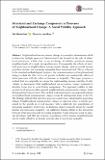Structural and exchange components in processes of neighbourhood change : a social mobility approach
Abstract
Neighbourhood socioeconomic change is a complex phenomenon which is driven by multiple processes. Most research has focused on the role of urban-level processes, which lead to an exchange of relative positions among neighbourhoods of a single metropolitan area. Consequently, the effects of structural processes on neighbourhood socioeconomic change, such as overall income growth or decline, and increasing inequality, have been neglected. This is reflected in the standard methodological practices; the common measures of neighbourhood change exclude the effect of overall growth or decline and confound the effects of urban processes with the effect of increase in inequality. This paper proposes a method that was originally developed for understanding income mobility of individuals, to decompose total neighbourhood socioeconomic change measured in absolute terms into its contributing components. The approach enables to take account of all processes that generate neighbourhood socioeconomic change, while distinguishing between them. The method is demonstrated in an empirical analysis of neighbourhood socioeconomic change across 22 metropolitan areas in the US. The findings indicate that structural processes can be most substantial in generating change. Neighbourhood socioeconomic change in ‘superstar cities’ is mostly generated by the growth in overall incomes, with a relatively low contribution of increasing inequality. Conversely, in declining cities it is mostly driven by overall decline and increasing inequality. An additional finding relates to the interaction between urban processes and increasing inequality. These processes work in opposite directions such that any increase in positions of low-income neighbourhoods can be totally offset by an income decrease due to increasing inequality.
Citation
Modai-Snir , T & van Ham , M 2018 , ' Structural and exchange components in processes of neighbourhood change : a social mobility approach ' , Applied Spatial Analysis and Policy , vol. First Online . https://doi.org/10.1007/s12061-017-9249-z
Publication
Applied Spatial Analysis and Policy
Status
Peer reviewed
ISSN
1874-463XType
Journal article
Description
The research leading to these results has received funding from the European Union’s Horizon 2020 research and innovation programme under the Marie Skłodowska-Curie grant agreement No. 702649; and from the European Research Council under the European Union’s Seventh Framework Programme (FP/20 07 - 2013)/ERC [Grant agreement No. 615159] (ERC Consolidator Grant DEPRIVEDHOODS, Socio-spatial inequality, deprived neighbourhoods, and neighbourhood effects).Collections
Items in the St Andrews Research Repository are protected by copyright, with all rights reserved, unless otherwise indicated.
Related items
Showing items related by title, author, creator and subject.
-
Written evidence: The House of Lords Environment and Climate Change Committee - Inquiry into behaviour change in the context of climate change and the environment
Field, Sean; High, Mette Marie; Skrzypek, Emilka (2022-01-26) - Report1. Executive Summary 1.1. The financial sector has a key role to play in supporting and enabling behaviour change to achieve a societal shift from fossil fuels toward renewable energy generation and infrastructure (REGI). ... -
Engage for change : the role of public engagement in climate change policy
Creasy, Stella; Gavelin, Karin; Fisher, Helen; Holmes, Lucy; Desai, Maya (Sustainable Development Commission, 2007-09) - ReportIn recent years the British Government has stated explicitly its determination that citizens should contribute to the policy making process within all levels of government. The Sustainable Development Commission invited ... -
River channel planform changes in upland Scotland : with specific reference to climate fluctuation and landuse changes over the last 250 years
McEwen, Lindsey Jo (University of St Andrews, 1986) - ThesisRates of river channel change in three contrasting Scottish upland environments have been studied within the context of Climatic fluctuation and landuse changes over the last 250 years. The object of the research was ...

